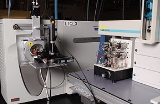
Liquid chromatography-mass spectrometry
Overview
Analytical chemistry
Analytical chemistry is the study of the separation, identification, and quantification of the chemical components of natural and artificial materials. Qualitative analysis gives an indication of the identity of the chemical species in the sample and quantitative analysis determines the amount of...
technique that combines the physical separation capabilities of liquid chromatography
High performance liquid chromatography
High-performance liquid chromatography , HPLC, is a chromatographic technique that can separate a mixture of compounds and is used in biochemistry and analytical chemistry to identify, quantify and purify the individual components of the mixture.HPLC typically utilizes different types of stationary...
(or HPLC) with the mass analysis capabilities of mass spectrometry
Mass spectrometry
Mass spectrometry is an analytical technique that measures the mass-to-charge ratio of charged particles.It is used for determining masses of particles, for determining the elemental composition of a sample or molecule, and for elucidating the chemical structures of molecules, such as peptides and...
. LC-MS is a powerful technique used for many applications which has very high sensitivity and selectivity. Generally its application is oriented towards the general detection and potential identification of chemicals in the presence of other chemicals (in a complex mixture).

